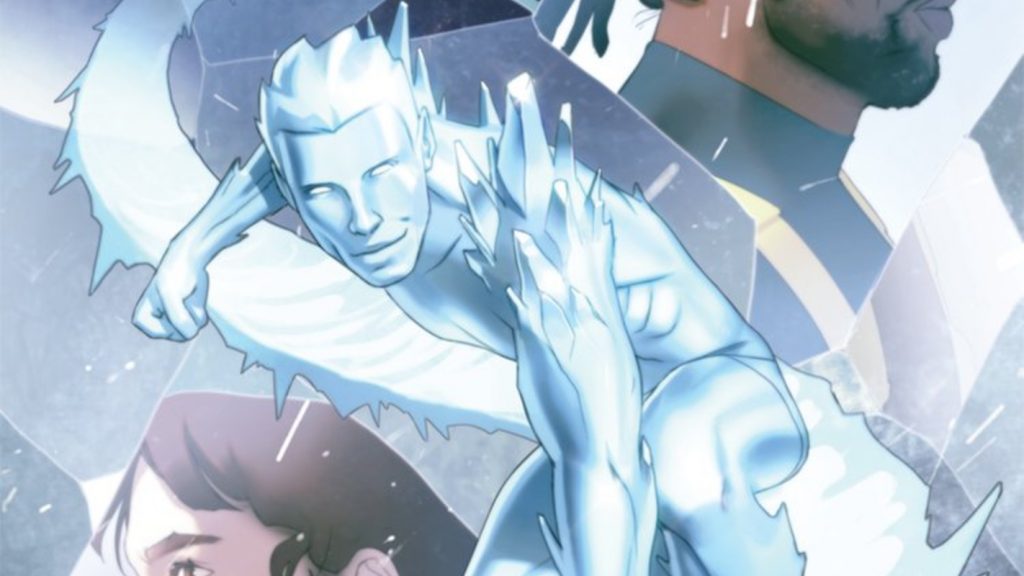
Comics Corner: Iceman Should Have Been Bi

In 2015, Iceman was revealed as gay, becoming the X-Men’s – and by extension, Marvel’s – most prominent out character. It was a mistake.
Hold fire – you’re still on Gayming Mag, and we still welcome greater LGBTQ+ representation in media. The problem, the mistake, is that Iceman – real name Robert “Bobby” Drake, and one of the original five X-Men – ideally should have been revealed as bisexual.
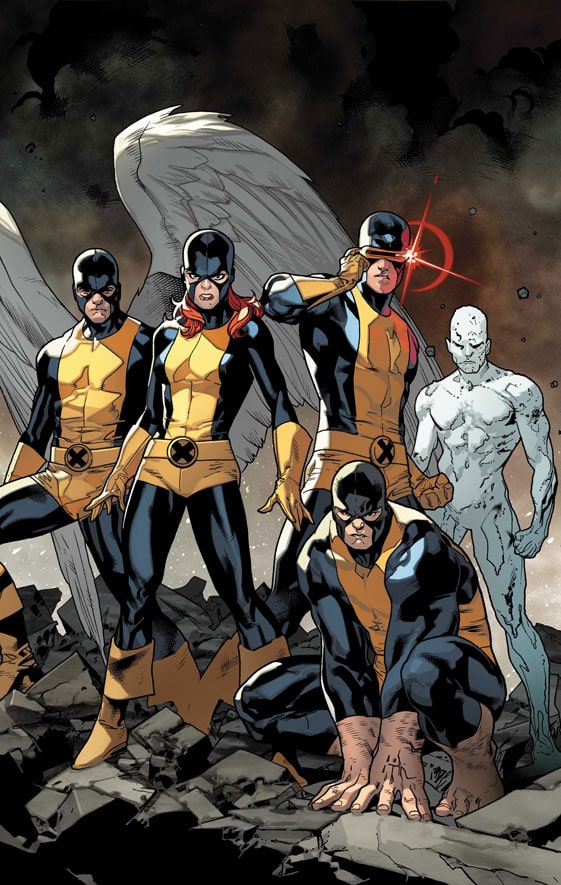
Flashback time! In 2013, writer Brian Michael Bendis and artists Stuart Immonen and Wade von Grawbadger brought back the X-Men. The original X-Men – the teenage versions of Cyclops, Marvel Girl, Angel, Beast, and Iceman, plucked from history (specifically, the pages of X-Men #8) by the present-day Beast in order to restore the course of mutant history. The younger team ended up staying around for several years, shocked by the future they saw and their own often-grim fates as they rubbed shoulders with their adult selves. In the course of the series All-New X-Men, the younger version of Iceman is revealed as gay, even though – to all appearances – the adult version is not.
You may have noticed I use the term “revealed as gay” rather than “comes out”, and that’s because Teen Bobby’s coming out as gay is especially awkward when we consider how it happened. Rather than realising his sexuality and coming to terms with it himself, the younger Iceman has it effectively forced on him by the young Marvel Girl, Jean Grey. In All-New X-Men #40, after Teen Bobby makes a flippant comment about the “unbelievable hotness” of their female teacher Magik, Jean pulls him aside and tells him he’s gay. After a five-page conversation with Jean, during which being bi is explicitly ruled out, he rapidly acknowledges it.
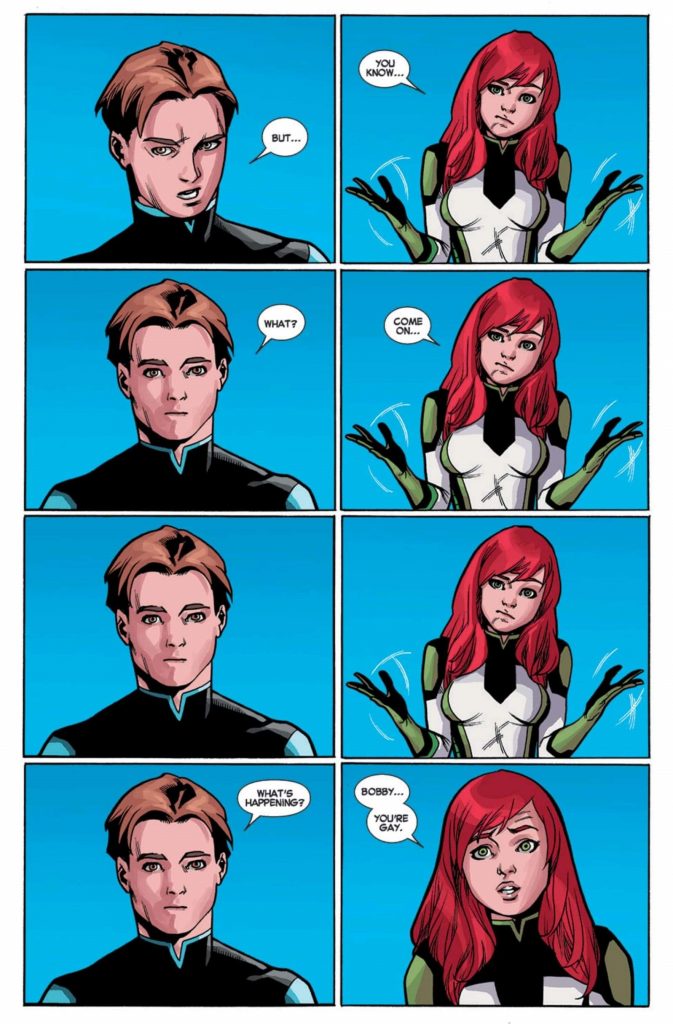
When Teen Bobby later confronts the adult Iceman about this, Bobby-the-elder also relents, and in another five pages also accepts that he is gay, saying he had chosen to bury that part of himself so there would be “one part of my life that I’m not being persecuted for”.
The problem isn’t that Bobby’s personal realisation is necessarily unrealistic (aside from the mechanism of meeting your own younger self and having your own coming out forced on you by a teenage telepath; that’s far from the weirdest thing to happen in superhero comics). After all, plenty of gay men come out later in life after solely dating women. The issue is that the storyline specifically and immediately erases the mere notion of him being bi. This is problematic for two reasons – one, it ignores decades of Iceman’s backstory, and two, it robs bisexual readers of some much needed representation.
On the first point, Iceman had had plenty of opposite-sex romances and attractions over the years, including with Polaris, Shadowcat, and Mystique from the X-Men’s own ranks, plus civilian love interests such as Opal Tanaka. While they all ended in heartbreak, or occasionally betrayal, that’s the case for most superhero romances – a trope largely the result of corporate-owned characters needing to have their status quo preserved, only presenting the illusion of progression. Very rarely do superhero couples stay together. Claiming that, in retrospect, Iceman’s relationships with women failed because he was secretly gay feeds the harmful real-world idea that bisexuals don’t exist, or that it’s just a step on the road to being gay. It also disregards straight-presenting relationships where one or both partners are bisexual. Bisexual people’s relationships with opposite sex partners are every bit as real and valid as their same-sex ones, and having Iceman as bi would have reinforced that positive message.
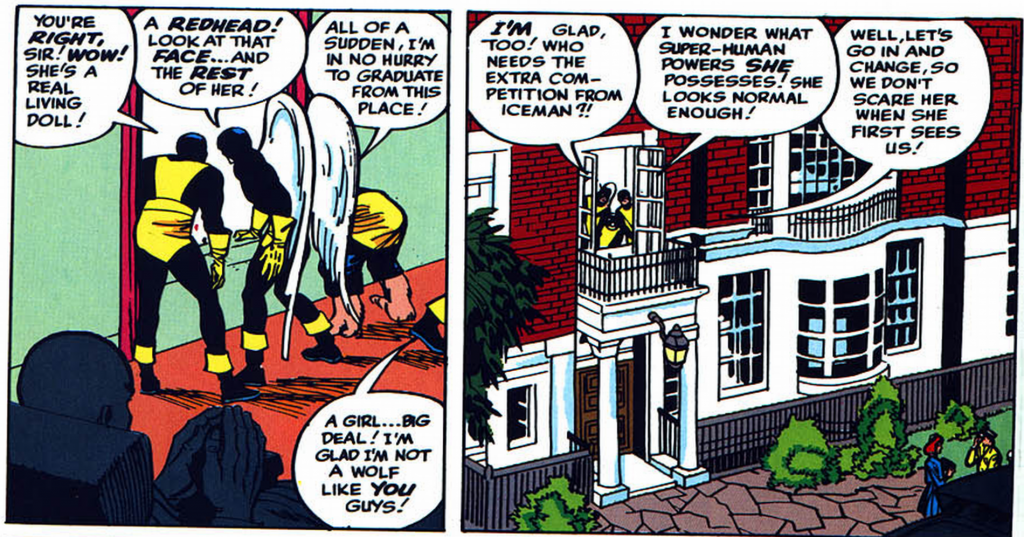
Conversely, Iceman had also been hinted at as having conflicted romantic feelings for, well, ever. As far back as the very first issue of X-Men in 1963, the team’s first appearance, Bobby walks off while the other male members are lusting over the arrival of Jean Grey, and in more recent years, reacted strangely – and initially aggressively – to the flirtations of gay male teammate Northstar. This is fairly textbook behaviour for bisexual men struggling to accept their own attractions.
With some minor tweaking to Bendis’ storyline, both young and old Bobby could have realised their sexuality, still had that apotheosis of the self that comes with coming out, and stood as one of the few bi male heroes in mainstream superhero comics, all without erasing significant chunks of the character’s past.
Which brings us to the second problem. Bisexual representation is still fairly wretched across the board, be it in comics, television, movies, or games. Whether male or female, bi characters continue to fall into clichés of being greedy or indecisive when it comes to their partners. However, while female bi characters all too often suffer from being portrayed as a straight male fantasy, male bisexuals don’t even get that much exposure. Bi men in fiction are vanishingly rare, and on the rare occasions where they do appear, they’re overwhelmingly shown as a villain or presented as somehow damaged. Even comics’ best known male bisexual, John Constantine, is (by design) an utter bastard. In having Jean tell Bobby he’s “full gay”, the Iceman storyline contributes to bi male erasure, and robs readers of what could have been a purely heroic bi male character.
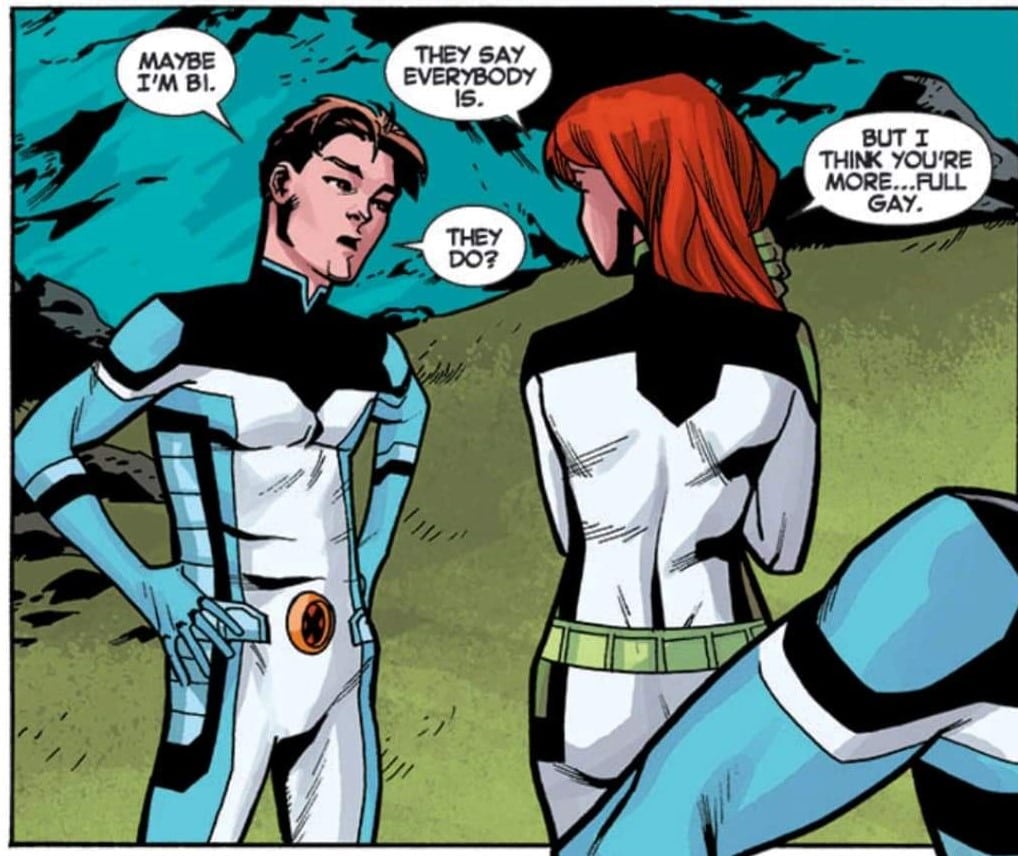
Had Iceman come out as bisexual, it would have been win-win for Marvel. Not only would it still have added some more diversity to the comics landscape, it would have increased the visibility of other groups within the LGBTQ+ community – that’s some easy positive PR, right there. It would have presented richer storytelling possibilities too – a newly confident Iceman navigating what it means to be bi would be something sorely missing from comics, as well as providing a necessary bi male role model in fiction.
Still, Iceman has blossomed into one of the better and more rounded gay characters in comics, and that should be welcomed in its own right. Later writers have brilliantly fleshed out Bobby as an out gay man, giving both Teen Bobby and Adult Bobby their own male love interests. In particular, writer Sina Grace’s two solo Iceman series, focussing on the adult version, have been excellent. However, the Marvel Universe would have been richer, and comics as a whole more diverse, if Iceman had been bi.
(With thanks to Dan Hart for additional image research)

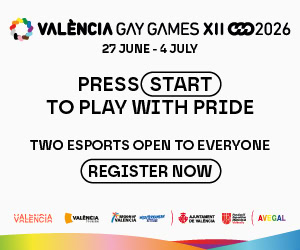




I very strongly disagree with this article. While the author is correct that bisexual characters are often under-represented (or often portrayed poorly when they are represented), Iceman works extremely well as a gay character, and his portrayal is important and critical: Queer characters are often met with hostility by the straight cis-male readership that many mainstream entertainment companies assume makes up the majority of their fan base. But even among queer characters, gay men are met with particular resistance because their presence undermines presumed assumptions about masculinity in these spaces (whereas depictions of queer women, for example, can be co-opted for straight male pleasure). Having one of the flagship members of the X-Men be portrayed as a gay male (rather than a bisexual male, who later authors who are uncomfortable with same-sex sexuality can shunt back off into straight relationships [*cough* Hercules *cough]) is a powerful statement that has important and lasting implications for inclusivity in the Marvel landscape. That point aside, portraying Bobby as a gay male also believably represents a very often overlooked and misunderstood identity: that of someone who comes out later in life. Far from disregarding his opposite-sex relationships, portraying Bobby as gay accurately portrays an individual who was in denial about his own sexuality and attempted to ‘fit in’ or ‘fix himself’ by forcing himself into an opposite-sex relationship. While it is true that sensitive and positive portrayals of bisexual individuals in healthy relationships is critical and often lacking, gay or lesbian individuals who come out after being in an opposite-sex relationship are often faced with disbelief from people who say (in the case of a gay male, for example), “Well, you can’t *really* be gay; you were in a relationship a woman for so long” or “You seemed so happy with her, can’t you just make it work?”. Bobby’s being Gay also allowed for Sina Grace’s sensitive and compelling exploration of his identity in his runs on Iceman, which together make for what I believe is easily the best queer comic ever to grace the pages of Marvel (or DC, for that matter).
Bi-Erasure is a real and serious issue in media and in society at large. But positive portrayals of gay men in lead roles in major comics, as well as gay men who come out later in life, are rare and critical. Bobby could have been Bi, yes. But I believe that portraying him as (as Jean inelegantly and insensitively puts it) “full gay” was absolutely the right decision, both for Bobby as a character and for the landscape of comics at large.